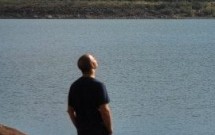
Southwestern College, Santa Fe
Notes from Cooper Riis by Eliza Buck 7-13-12
Sensing safety takes time. I’ve been at Cooper Riis for 13 weeks now and have just acquired a level of safety that enabled me to propose a new group and move it forward to actuality. This process helps me understand the value of a long term healing model. It simply takes time for some of us to allow ourselves to be seen publicly.
Many residents try to isolate by staying in their rooms for long periods, not showing up for community meetings or work, and not eating meals at scheduled times. I purposefully used the phrase “try to isolate” because there is little real opportunity to do so here. Despite one’s best effort to isolate, staff and other residents consistently seek them out. In fact, one of my tasks here at Cooper Riis has been to locate and motivate residents who are trying to isolate.
Recovery Coaches and Recovery Coordinators provide the safety net of keeping an eye on the whereabouts and condition of each resident. My internship includes many of the tasks of the Recovery Coach including locating and motivating residents, one-on-ones, extra support, orientations, and accompanying residents to special meetings. In this role, I get to see many of the defenses residents employ to maintain a sense of safety and control. Often these are self-defeating behaviors that keep them in their undesired states of depression, anxiety and distress. In my position, I have also witnessed residents relax and express joy when they become engaged in the community.
Sensing community takes time. Shared meals, words, and proximity all contribute to a sense of belonging. This process cannot be forced or sped up: it must be lived. For this reason, participation is necessary. This brings me back to safety. In order to participate, we must feel safe (at least to a minimal degree).
Safety comes with experience and faith. There’s simply no way of ensuring our safety so we must make a leap of faith. The subjective experience of safety implies a sense of comfort and a perceived protection from physical, psychological, and emotional harm. All of this leans on experience. Cooper Riis practices a long-term approach that takes this into consideration. I am grateful to experience this approach.
 Southwestern College Santa Fe, NM
Southwestern College Santa Fe, NM





